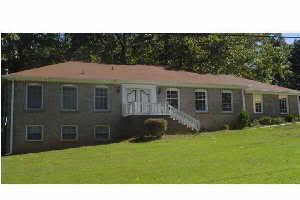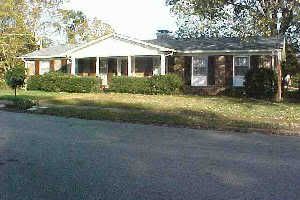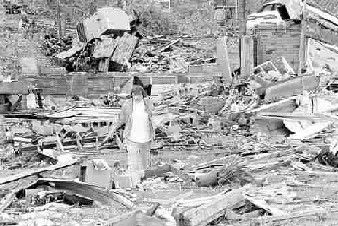for Part 1 -- The Tornado, click here.
for Part 2 -- The Trip to RoEllen, click here.
Part 3 -- Dustin
At this point in the story, I always feel inadequate to the task of retelling it. (Notice how long it's taken me to put up this installment.) How can I express my apprehension? How can I fully explain my incredible fear? I cannot. When my father died in 1994, our family had died. Period. The psychic and emotional trauma that surrounded his passing had fractured what was left of my mother's sanity, my sister's patience, and my own decision-making skills. We weren't a family, we were an ICU ward. And now this? I was actually frightened that someone would have to be committed to an institution before the week ended. Now imagine incalculable terror compounded by the ill omen of insane weather. Not only were we being personally attacked by tornadoes, but the freakishly high barometric pressure had us all feeling that our sinuses were going to explode. The entire situation reminded me of the old children's album Witches Brew; however, instead of "oral language development" this crockpot was bubbling over with rancorous malevolence.
**************************************************
Like an experienced Formula 1 driver, Tommy wove his way through the stalled traffic until we arrived at the I-40 interchange, where traffic was backed up (literally) for three miles.
"It's an emergency, right?" said Tom Jr.
Tommy grinned, activated the hazard lights, and pulled us onto the side of the road. We sped down the emergency lane until 40 cleared enough for us to make good time.
**************************************************
Exactly two hours and thirty minutes after leaving Nashville, we rolled into Dyer County. My discomfort was obvious, my worry palpable: what would have happened to my mother and sister? Did anything survive? Would there still be pictures of my father, somewhere? On a lesser note, what had happened to our wedding gifts? Jami and I had been storing our wedding gifts at my mother's house in lieu of keeping them at our transitioning homes in Tennessee, Florida, and Georgia. (Note: this is the part of the story that really affects some people . . . a co-worker at Barnes and Noble made cooing noises when I told this story during a lunch break -- you know the noises I mean: "Aww, too bad." "Wow, your neighbors died and all." "Yep, that's tough. Indeed. Tough indeed." Then I casually mentioned that we had lost our wedding gifts, and she imploded. Literally. There was an event horizon, and everything. Gravity lost its pull, the chairs and tables and oxygen in the room all fell into her yawing mouth, and we all had to clutch desperately to the book racks to keep from being sucked in ourselves. She then began to radiate outrage, and the raw power of her indignation caused the Hot Pocket in my hand to catch flame. "WHAAAAAT???? YOU LOST WEDDING GIFTS?????!!!!!! THIS -IS- A TRAGEDY!!!!!!!!!" I always wanted to meet her husband and ask if they had somehow lost gifts. Never did.)
***********************************************
Insult heaped upon injury: upon our arrival in Dyer County, Highway 104 towards RoEllen was packed, bumper to bumper. Odd, indeed, for Dyer County in 1997 only had about 37,000 people.
Fun fact: look here at the census statistics for Dyer County, Tennessee versus my current home in Gwinnett County, Georgia. Notice that Dyer County has 37, 308 people living on a total land area of 510 square miles, while Gwinnett County has 673,345 people living on a total land area of just 433 square miles. Hmm. I think of locusts, here. A locust is merely a grasshopper with a high population density . . . once the population density for the area becomes twice normal, a locust develops rudimentary teeth, sharpened forelegs, and begins to attack other creatures en masse. Makes you wonder about our urban areas, doesn't it?
****************************************************
We soon discovered the reason for the traffic -- all roads leading to my house were packed. Rubberneckers. Everyone in a hundred mile radius had seen the reports of the devastation on CNN, and they packed a cooler full of food, chucked the kids in the car, and were off to sightsee at the expense of my mother's dignity. Hey! Here's fun! Maybe they have yet to move the bodies! Bring a disposable camera!
Billy Pilgrim, in Vonnegut's Slaughterhouse-Five, finds himself weeping suddenly at various times for no apparent reason. We readers know that it is connected to the great trauma he underwent at the firebombing of Dresden, Germany, but Billy cannot recognize the cause. Nor does he really worry about it, as he sometimes doesn't even notice himself doing it. He doesn't wail, or moan, or gnash his teeth, but he discovers himself crying a great deal, "as if his eyes were leaking." That was me. That was I. That was the author of this post. As we ever so slowly neared my house, I found that I couldn't keep from crying. However, I wasn't really feeling sad, or distraught anymore; instead, I felt empty, hollow, unreal. I felt like I was adrift in a powerful current -- check that, I felt like I was being tugged by the aftertow of a powerful current that had passed. The wave (of reality? time? probability?) had moved on, somehow, and rather than being pulled along I had fallen through the crest. Here's the really funny thing -- I could actually see the wave that I'm talking about, see it physically in front of my face as we neared Cribbs Road. It was blurry through the tears, but it was an actual, material object for a few seconds. Then we made the turn onto Cribbs, and I thought that I might collapse.
*****************************************************************
I must apologize to you, here, for I have no "before" photograph of my home to show you. As far as my mother and I can tell, no complete photos of the exterior of our home survived the tornado. I do have two photographs that can be combined together to approximate our house's exterior.
In physical size and layout, our home was very close to this one:

However, ignore the front door. Our house was a one-story all-brick ranch built into a hill with a basement exposed on one side, but it also had a huge front porch (unlike the above picture) with four columns, plantation-style. In reality, the front of the house looked more like this one:

We had a gorgeous home on a lakefront property with 3.5 acres. Retail price, rural Dyer County, Tennessee, 1997? $84,000. That gave us one of the most expensive non-farm properties in the county. I chuckle as I write this from my much smaller, much more expensive subdivided house on a slab in the middle of our one-sixteenth acre homestead . . .
According to my oft-errant memory, these photographs most closely resemble our house. I cannot produce a "before" photo; I still cannot believe the "after" photo.
*************************************************
When we crested the hill on Cribbs Road that overlooked my house, here is the first thing that I saw:

*************************************************
Remember the wave I described earlier? I could still see its edges, framed around the desolation.
*************************************************
Now -- one of the many erroneous things my father taught me was that psychology was a "load of horses**t!" By this I think he meant that he did not believe that psychological trauma was a justification for poor judgment. In this I agree with him, to a point: poor judgment or not, there are still consequences for every action, whether or not those consequences are fair, just, or take into account the heart of the actor. If you shoot someone in the head that looks like your abusive father, you will face severe consequences even if you were confused at the time. (Please don't test this -- trust me. Especially if you live in Texas.)
However, I did not yet possess the ability to discern shades of grey when it came to memories of my father's wisdom. I was still in the stage where he was either completely right or completely wrong and to question him was to accept his early death and my anger, my limitless high-strung anger, my overweening anger, my anger was inescapable and either directed towards him or against him AND I COULD NOT DEFEAT HIS WISDOM BECAUSE YOU CANNOT QUESTION A DEAD MAN AND -- you get the point. The irony of ironies was that I had refused therapy after my father's death because I believed that I would betray his memory if I accepted it, yet I really needed therapy because I couldn't deal with his death. Dad would appreciate this.
How do the preceding paragraphs on psychology intercede with the story?
I truly believe that I was about to go insane after I saw the house.
Don't confuse this part with storytelling, or dramatics, or exaggeration -- I could physically see a wave of energy shimmering before my eyes. I realized as I viewed the scene that there was a single shrieking note emanating from somewhere; I thought it was a nearby car horn, or something, and in VERY bad taste, considering the destruction. It was so loud that I had difficulty hearing my uncle and cousin ask me questions about what they could do. Later, as I chatted with people who had been there at the scene, I realized that there was no sound. I was the only one hearing it. It was being generated solely inside my head.
******************************************************
The wave, the note: I've often wondered what could have happened out there, in RoEllen, on April 16, 1998. I felt, at the time, that my face was about to slide off of my head, that a literal crack had appeared at the top of my skull to split my cranium into discrete pieces. And, of course, Dad had everything to do with that. His death was the wedge, and the tornado provided the force. I was having trouble breathing -- there was something on my chest, it felt like -- and I was fighting a disconnection between my senses, my memory, and my conscious awareness. The world, it seemed, was winding down.
(I had felt this way once before, on June 13 of 1994, walking out of the HCA Hospital in Jackson, Tennessee. Behind me was a dead man covered with a bedsheet; ahead of me were glass doors. I couldn't catch my breath that night, either, and as I plunged out into the darkness and looked up at the moon, I was struck with the impossible sensation that I was about to fall into the sky. My sister was with me, and I clutched her hand tightly until we found the car because I was actually scared that I might fall upward into the night. I was eighteen, and she was twelve, but without Meredith there, I still don't know if I would have actually made it to the car.)
In the Explorer, I really had no one. Tommy and Tom, Jr. shared an awkward enough relationship without adding me to the mix. Tommy was the mover and shaker, the bold financial visionary, the glad-hander, the incomprehensibly successful money man; Tom Jr. was a financial failure, a musician, an introspective thinker, a worrier. And so, they didn't really communicate. And I wasn't particularly close to either of them. Thanks to my mother's ineffable yet incessant worry that somehow we were "trashy" when compared to other families, they had both been browbeaten with my academic prowess and intelligence. "Maybe my husband can't keep a job or make an intelligent financial decision, but by-God our son will do well with his native intelligence that by the way proves that we have been good parents and justifies every single decision we've made." (Not an exact quote, but a true one.) They didn't know what to do with me. Nor was the situation conducive to pithy wisdom or ingratiated comfort: they were as stunned as I was.
Would I have fallen into a agonizing disassociative state? Would I have fallen apart completely? What would have become of me? A few months ago I did a search on my symptoms out of morbid curiosity, and I ran into this website that terrifies me -- I honestly don't know what might have happened.
*********************************************************
Might have. Here's what did happen: we pulled into what was left of the driveway, and I was completely speechless. I fumbled for the door handle, and couldn't get it to work -- my eyes were fixed on the scene -- until, unexpectedly the door opened from the outside, and I was face to face with Dustin Adkins.
Dustin, my best friend.
Dustin, who is still closer to me than any other family member.
Dustin, who came to live with us after his mother left town.
Dustin, with whom I had shared every joy and heartbreak I had known for the fourteen years I had lived in Dyer County.
Dustin, who lived just south of Nashville, two and a half hours away.
Dustin, who once he had heard that the tornado had struck, had stumbled from bed and immediately -- IMMEDIATELY, without packing a bag, a change of clothes, or a coat -- driven to RoEllen to "make sure your Mom was okay."
Dustin, who had arrived in town, made sure that my Mom and Meredith had a place to stay, purchased them clothes on his dangerously overextended credit card, and then returned to the house to try and find my mother's wedding ring, which she had been cleaning in a Pyrex dish on her nightstand that evening.
Dustin, whose first words to me were "We'll make it through this."
****************************************************************
About two years ago, Dustin met me in Nashville where we spent the afternoon bumming around in Green Hills. Classic Dustin: he showed up unexpectedly at my sister's dormitory because I had casually mentioned on the phone about a month before that Meredith was moving. A quick knock on the door then it swung open; there was Dustin with a sheepish grin. "I thought you might need the help moving the heavy stuff." Did I mention that he had moved to Denver, Colorado six months previously? Yes. He -drove- down.
After we moved Meredith in, he asked if we could drive around and talk a bit. So, we did. I asked him about his church home in Denver and the ministry position he had accepted. He hesitated, and finally admitted that he was concerned about the church.
"What's the problem, big guy? Too liberal for you?" (Dustin was a notorious conservative, especially about theology.)
"No, I'm really . . . really . . . concerned about . . . the church dividing."
"Dividing, why?"
"There's . . . I . . . I don't know . . . the eldership . . . I don't know how to tell you this . . . I'm . . . please don't . . . I don't . . ."
Now I was very concerned. I looked over, and there was Dustin, a twenty-six year old man bawling like a baby. He looked at me, shamefaced, and whispered, "Brad, I'm . . . gay."
***********************************************
This is a story about a tornado, about my family. Dustin is part of that family. As I write this, I have on the desk in front of me a "Christian" publication that advocates excommunicating homosexuals from churches for their perversion. "They want to be 'out?' Drive them out!" says the most often quoted minister in the piece. Nothing new, really, as my kids at school brand the most heinous crimes against their attention span as "gay" activities; the unsocial or awkward kids are obviously "faggots," right? Right?
As I said before, this is a narrative, not a position paper. Dustin's admission remains the most shocking experience of my life; indeed, he could have said that he enjoyed drinking caribou urine in tattoo parlors while reciting Luther's Ninety-Six Theses, and I would not have been any more surprised. To this day, I don't know what to do with it, or him.
But I know I love him. Unconditionally. When I needed -- most desperately needed -- hope in my darkest hour, he was it.
Those same kids who unknowingly label all that is hated and despised by them with epithets about sexuality, many of them wear little bracelets that say "WWJD."
What would Jesus do?
I have no idea. I believe that he would have been there for me, too; muddy, dirty, sleepy, but more concerned with my welfare than his own. I like to think that Jesus would do those jobs that no one else would, that his very presence would bring comfort, and hope, and peace.
I've never seen Jesus. I've seen Dustin.
************************************************
Maybe I have seen Jesus.
************************************************
(He was bawling, and he managed to whisper, "Please don't hate me" before I could get the car to the side of the road with the hazards on. My shock -- my indignation -- my fear evaporated in the face of his sheer terror, his greatest fear: he was afraid that I would never speak to him again. He cradled his head in his hands, and continued to cry.
I put my hand on his arm and whispered the only thing I could think of, the first thing that popped into my mind:)
************************************************
We'll make it through this.
We've been through a tornado.
We'll make it through this.